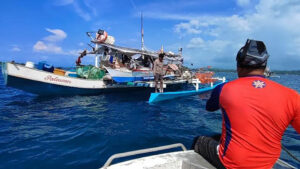POLAND’s Foreign Minister on Wednesday urged China to follow international law and a 2016 arbitration ruling that reaffirmed Manila’s claims in the South China Sea.
“Freedom of navigation is a fundamental principle enshrined in the United Nations Convention on the Law of the Sea (UNCLOS) that has already been mentioned,” Polish Foreign Minister Radoslaw Sikorski told a news briefing in Makati City.
“We think that the arbitrations under UNCLOS should be followed, should be honored, and therefore the Philippines has our solidarity on this matter.”
The Chinese Embassy in Manila did not immediately reply to a Viber message seeking comment.
At the same briefing, Philippine Foreign Affairs Secretary Enrique A. Manalo said both countries are keen on more partnerships on maritime education, environmental protection and defense ties amid tensions with China in the South China Sea.
“In an era marked by unprecedented challenges and complex geopolitical dynamics, it is imperative that we uphold the principles that safeguard the sovereignty and rights of all nations… and ensure all states fulfill their obligations under international law,” he said.
The Chinese Foreign Ministry on Monday urged the Philippines to remove an “illegally anchored” vessel at Sabina Shoal in the South China Sea after a collision between their ships on Saturday.
A Philippine task force handling sea disputes with China on Saturday accused a Chinese vessel of “deliberately” ramming the Philippines’ largest coast guard vessel named BRP Teresa Magbanua thrice near Sabina Shoal.
The Chinese Coast Guard vessel caused significant damage to the ship and endangered the lives of its personnel, it said.
Based on data released by the Philippine Navy, there were about 203 Chinese vessels within the Philippine exclusive economic zone from Aug. 27 to Sept. 2, up from 163 a week earlier.
“I think we can work together to see how we can promote greater awareness of the importance, especially in today’s world of enhancing commitment to international law as agreed and also in a rules-based order,” Poland’s top diplomat said.
Mr. Manalo earlier said the Philippines had expressed its displeasure with China after Saturday’s collision — the second confrontation in days — adding that it did not help cool tensions in the South China Sea.
He said the Chinese side had, in response, “accused us, as usual, of doing this and that.”
The government of President Ferdinand R. Marcos, Jr. has filed 176 diplomatic protests against China, 43 of which were filed this year, Philippine Foreign Affairs spokesperson Ma. Teresita C. Daza told reporters in a WhatsApp message late Monday.
In 2016, a Hague-based arbitration court upheld the Philippines’ rights to its exclusive economic zone within the waterway. It rejected China’s claim to most of the sea based on a 1940s nine-dash line map that Philippine Foreign Affairs Secretary Enrique A. Manalo has said “had no basis in law.”
Manila has been unable to enforce the ruling and has since filed hundreds of protests over what it calls encroachment and harassment by China’s coast guard and its vast fishing fleet.
The US, New Zealand and Australian embassies in Manila have expressed concern over the incident, urging China to follow international law.
Meanwhile, Mr. Manalo also asked his Polish counterpart to encourage more Polish businesses engaged in agriculture and in the automotive industry to expand their operations in the Philippines.
“I also expressed our desire for more Polish companies to look into investing in the Philippines especially in the automotive industry, transport logistics, energy and green technologies,” Manila’s top envoy said.
Mr. Sikorski said Poland’s deputy ministers for digitalization, defense and agriculture are set to meet with their Philippine counterparts to explore cooperation between these sectors.
“We also want to better reflect the potential of our economies and to achieve even better results,” he said.
“That is why Secretary Manalo, and I discussed today how we can improve market access for our products, including agri-food products.” — John Victor D. Ordoñez

